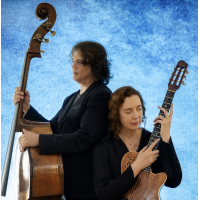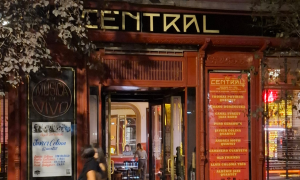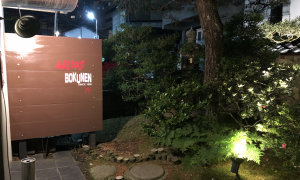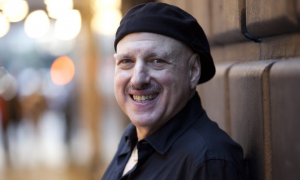Home » Jazz Articles » The Jazz Life » My 'Other' Brother -- Remembering Jack Wilkins: 1944-2023
My 'Other' Brother -- Remembering Jack Wilkins: 1944-2023

He had the right hand of Doom!
—Sheryl Bailey
Prologue
This piece, in a shorter form, appeared as a post on my Facebook page a few days after my friend Jack Wilkins died on May 5, 2023. On behalf of a group of close friends I also helped write a remembrance piece for WBGO, one or two quotes of which are also included here. I thought that was it. I had written out my grief, certainly in terms of public displays anyway.Then we discovered that the New York Times had decided not to run an obituary. I have been gripped by a growing rage at the dismissive stupidity of them saying in effect that the passing of one of the world's great guitarists—let alone jazz guitarists—is not important enough to merit a mention in the "newspaper of record" after a lifetime of musical achievements as a performer and educator unless his friends and family chose to pay for it. (I remain a supporter of the paper in general, but this—it's just idiotic. Then again, we're all in the jazz life here, so it really should not be a surprise even when it is.)
I understand all the arguments for and against the decision, space in the paper, popularity of jazz, blah, blah blah. But Jack wasn't just any old good guitarist. He was acclaimed by his peers and critics alike as being on a level achieved by few others in jazz at any period of its history, on a par with his heroes (and in some cases friends) like Johnny Smith, Tal Farlow, and Jimmy Raney—and his influence on guitar players and popular music (his track "Red Clay" for example, has been sampled and used in non-jazz mashups) can be heard in any number of younger players, as well as more established ones. Few others, however lauded, can claim that.
So, this is not just my farewell to my friend, but I hope a testament to who he was and what he achieved in the nearly 80 years he was with us.
Remembering Jack Wilkins
Jack Wilkins is dead. It's hard to believe I have just written that.He was one of my closest friends for over 40 years. My "other brother" as we would call each other, best man at my wedding, alongside my brother Stephen, my other best man. Jack's wedding present (apart from being there) was to play a jazz wedding reception for us in my brother-in-law's house. I remember when the jazz trio who played the wedding reception, in Arkansas no less, asked us if they could play another half hour for free because they knew who Jack was, and the bassist and pianist had wanted to play with him for years! The oldest brother-in-law, meanwhile, twenty years my wife's senior and an amateur guitarist, planted himself in a chair five feet from Jack and, plate and cake in hand, spent the whole reception entranced, listening to and watching Jack play. The music was no-holds barred and people laughed and danced and whirled around him. And that was Jack. Few holds barred anyway, if not completely no-holds barred in life.
He died at Mt Sinai hospital on a cooling Friday evening a month shy of his 79th birthday. A circle of close friends gathered round him as his health deteriorated. In his room his fiancée Gayle Tapper, who knew Jack since they were teenagers, sat by one side holding his hand, while another close friend's daughter sat on the other stroking his hair. Another longtime friend gently rubbed his feet. A recording of Christopher Parkening playing Bach played in the background. I remember that at the bottom of the stairs in Jack's apartment a small landing permanently housed a music stand with a collection of Bach pieces on it. Jack had worked intermittently on mastering them for years and played a number of them pretty well to performance standard.
Jack's friendship changed and shaped my life in ways I have not yet been able to come to terms with, and like many other of his close friends I am not yet ready to embrace his loss even as I am forced to accept it.
What others are saying about him is absolutely on the money in terms of his generosity of spirit, his remarkable mastery of not just one style of guitar playing, but many, surviving a tough childhood that birthed a guy who in many ways was a "New Yorka" as much as any caricature that Joe Pesci or Danny DeVito could create. Brooklyn born and bred. He was just a guy—into sports (his wall was dotted with indentations from practicing golf shots with the same determined devotion he lent to practicing the guitar), movies—we would spend evenings quoting great lines from movies to each other and tasking the other to "name that film" while drinking pinot grigio and playing "Brooklyn Chess," which was basically regular chess with a profane accompanying commentary. It so pissed him off when I would occasionally win! And I would forget all my "proper" English upbringing and laugh gleefully.
I would walk home after an evening spent together almost floating on the euphoria of being the friend of one of the world's great musicians. Words were not the principal way Jack expressed himself, though he was nonetheless erudite and the musical conversations we had, both playing and otherwise, brought us both joy every time we got together. When we played together in his front room he was always generous of spirit and comment, encouraging, complimentary, willing to take time to offer advice on how your playing could be a little better, a little tighter, a little more like the master of the instrument he was, without for a moment making you feel like you were somehow "less" a player than he was. Music was how he expressed himself, especially when words failed.
For years, Jack taught a jazz guitar history class at Manhattan School of Music, and later at his home. His "blindfold" tests were challenging, instructive and fun. He once put on a cassette tape of previously unreleased tunes and challenged me to identify a sparsely recorded, brilliant guitarist of the 1950s named Billy Bean, who then became an obsession of mine for a while.
Conversations with Jack were often adventures, full of surprises just like his playing. One evening we were standing at the bar at Birdland, then on 105th Street and Broadway in Manhattan. He turned to me and said something about Charlie Christian being overrated, and not a great player. I looked at him for a moment, chuckled and said, "Are you trying to pick a fight?" He looked back at me, then beamed this "gotcha" mischievous big-kid smile he had.
He was part of a fast-fading generation of jazz musicians who learned to play on the gig as much as they woodshedded off it. He was unfiltered, exuberant, funny, smart and uncompromising in his commitment to his craft, and his embrace of life. He made the guitar seem simple to master, as a teacher and a player—when it is anything but.
When he was about 11 or 12 he became interested in learning to play a guitar that belonged to his cousin that lay around his house. Chuck Berry and rock and roll were just taking off, and his cousin taught Jack a few chords, enough to play doo wop anyway. I told him I was 13 or 14 when I first heard Joe Pass, and had the jazz guitar equivalent of a "Come to Jesus" moment.
"For me, it was Johnny Smith," Jack said. "My cousin was the one who introduced me to him. I'd never heard anything like that. I didn't know what it was. We did a lot of listening together. He was the one who introduced me to Django and Charlie Christian as well. After that I became obsessed with becoming the best player I could be."
By the time he was about 15, Jack was studying guitar with an older local guitarist named Joe Monte who taught him to read music. "Once I could read, I was on a whole different level of guitar playing from most everyone else, and there was a lot of paying work I could do," Jack added.
He had an often-mischievous sense of humor and we made each other laugh all the time. He once challenged me to a foot race knowing I was wearing wooden clogs. When we started down a partially cobbled street, he laughed so hard at me running like a guy wearing stilts that I ended up beating him. He would tell people that story all the time.
When I was considering getting married, for the first time at age 49, he was the guy I discussed it with. Was I too old, too set in my ways and so on and so on? A little later on my then fiancée (a working opera singer and Broadway performer at the time) and I hung out at his apartment close to Christmas; this is the guy who spontaneously suggested we record a Christmas EP together at midnight and pulled out his Fostex recorder. Right there, in his living room. Melody (yes, that really is my wife's name) was done with her Phantom work for the evening, and loved how Jack played (thank God we had slightly different taste in women!) and he accompanied her with such emotion and grace, and without a second thought invited me to join in as second guitar. That recording, to this day, is filled with moments of genuine joy, heartfelt music, and alcohol enhanced giggling.
His mastery was on a par with his musical heroes such as Jimmy Raney, Tal Farlow, Joe Pass, Chuck Wayne, Wes Montgomery, and Johnny Smith. The list of names he played and/or recorded with is legion—among them Michael Brecker and Randy Brecker, Stan Getz, Johnny Griffin, Bob Brookmeyer, Bill Evans, Chet Baker, Dizzy Gillespie, Kenny Barron, Phil Woods, and Charles Mingus. He toured with Peter Yarrow of Peter, Paul and Mary. "I learned to sing and play folk music with him," Jack explained. For years, he was a featured player in Buddy Rich's septet, played many Broadway shows such as Jacques Brel Is Alive and Well, toured the far east with Manhattan Transfer, and accompanied such singers as Mel Torme, Sarah Vaughan, Ray Charles, Astrud Gilberto, and Tony Bennett. He released over 15 recordings as a leader, and he was on more than 30 others as a sideman.
He was a generous musical partner, as well as a fearsome improvisor. Peter Bernstein, another friend of Jack's, told me, "Jack was great to play duo with. I was so flattered he asked me to do a gig with him at a music store in Connecticut. And his right hand. Man, he had all this genuine technique. He could play really fast if he wanted to, but it wasn't tricks. It was practice." Sheryl Bailey, a close friend of Jack's, said that, "He had the right hand of doom."
He had an encyclopedic knowledge of the Great American Songbook, including the words to most of the songs and stories about the people who wrote them, and was equally knowledgeable about post-bop jazz, including compositions by great modern masters like Joe Henderson, Wayne Shorter, Chick Corea and Herbie Hancock. Similarly, he wanted to know everything about the guitar. He could play authentic Brazilian samba, Cuban rumba, Argentinian tango, pretty decent flamenco, classical pieces at performance level, blues like Lonnie Johnson and B.B. King, terrific bebop and post-bop, right through to synthesized guitar (Alien Army, 1991).
At heart he was a great romantic despite the "tough guy" exterior of his younger days. We would listen to a piece of music, regardless of whether it was jazz or something else, and what moved him would often move me as well. So there we would be, two grown men in their late 30s and early 40s, sitting on the floor drinking wine and trying unsuccessfully to hide the tears that would well up into something palpable in the chest as the power of the music washed over us.
Jack and I had a couple of conversations about how, of all the guitarists around in the '70s and '80s as Jack came to prominence, to my ears he was the one who best embraced John Coltrane's music on the guitar. He was a musical sponge, transcribing and playing many solos at tempo, but in Trane's case, it was the spirit of the music as much as anything else that Jack really made his own. I think that was partly because, in their own ways, they were both romantics. People sometimes only hear the stream of notes Coltrane played, or feel the power of Jack's kinetic energy when he played. But Coltrane had such soul in his playing. And so did Jack. No matter what he played, it was always unmistakably Jack; and he instinctively reached out to you to join him, as either a listener or a player.
In the last couple of months we still found a way to communicate and to laugh. It was rare, in forty-plus years of knowing each other, that we got off the phone, or parted from each other without making the other laugh first. When he lay in his hospital bed, fidgeting despite himself, and I sat in a chair next to him and held his hand for a while, Bill Evans played on a speaker another dear friend had left for him. It was impossible not to notice the calm that came over him as he listened to jazz—his music, the source of his greatest joy and accomplishments—and was perhaps able to remember, for a few moments, when he and Bill Evans (and so many others whose names you would know,) had actually played together.
My other brother is now at peace. And I miss him already, even though he could be just next door if I try very hard to convince myself. I cannot talk for others, though I know quite a few who feel as I do. Jack's life and his legacy touched and enriched us all. And we are all the poorer for his leaving us.
As Peter Bernstein said so eloquently, "We have around us all these musical giants. And then they're suddenly gone and become a part of history."
A giant who embraced life wholeheartedly has left the room.
Tags
PREVIOUS / NEXT
Support All About Jazz
 All About Jazz has been a pillar of jazz since 1995, championing it as an art form and, more importantly, supporting the musicians who make it. Our enduring commitment has made "AAJ" one of the most culturally important websites of its kind, read by hundreds of thousands of fans, musicians and industry figures every month.
All About Jazz has been a pillar of jazz since 1995, championing it as an art form and, more importantly, supporting the musicians who make it. Our enduring commitment has made "AAJ" one of the most culturally important websites of its kind, read by hundreds of thousands of fans, musicians and industry figures every month.























